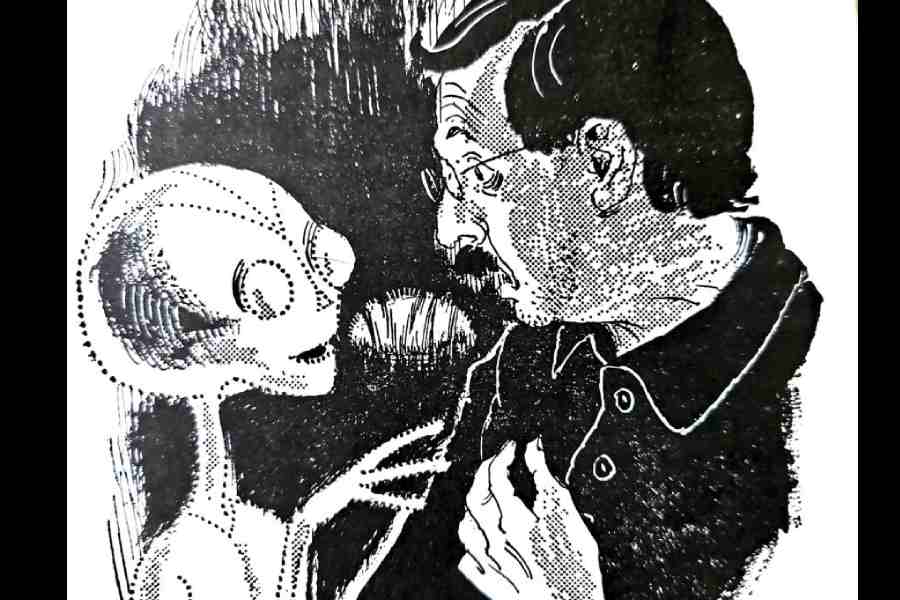Does Kankurgachi’s Bankubihari Dutta stand vindicated after all these years?
Decades ago, Bankubabu had been humiliated at his local adda after suggesting that extraterrestrial life exists and that it would not be implausible for Kankurgachi, then a suburban dot, to receive a visitation from outer space. This month, the American space agency, Nasa, published the findings of its examination of alleged sightings of hundreds of Unidentified Flying Objects — now rechristened Unidentified Anomalous Phenomena — to suggest that while the data, at present, do not support the existence of ETs zipping across earth’s skies, the possibility could not be ruled out and that — this is significant — there is a need for greater investment of modern technology, such as Artificial Intelligence, in the enterprise to find extraterrestrial life. The scientific endeavour, Nasa agreed, must also be conducted in a transparent manner.
Bankubabu, of course, is not real. That is perhaps why he — a creation of Satyajit Ray’s remarkable fiction — did, unlike Nasa’s scientists, end up meeting ‘Ang’, a resident of the planet, Cranius, whose faltering spaceship had made a pit stop at Kankurgachi. But there is a remarkable convergence between Nasa’s thoughts and those of Banku, suggestive of ways for science to benefit from fiction. What would make this convergence possible is a more durable truce between science and imagination.
A peek into the history of the evolution of the sciences would show instances of a wondrous complementarity between science — the realm of empiricism — and imagination — a sphere supposedly unfettered by facts. Albert Einstein’s prioritisation of imagination over knowledge goes to underscore the point: the creation of scientific knowledge, ancient or modern, would not have been possible without the faculty of human imagination. To cite just one example, the Wright brothers may not have come up with the airplane had it not been for Leonardo da Vinci’s flights of fancy in the fifteenth century. A lot is known about science’s adversarial ties with theology, manifest in the persecution or martyrdom of such men of science as Galileo and Giordano Bruno, but the cynical outcome of an asymmetrical relationship between established scientific principles and imaginative scientists has received feebler attention even though it has had its share of martyrs up until relatively modern times. Gregor Johann Mendel’s contribution to genetics went unacknowledged in his lifetime; Ignaz Philipp Semmelweis’s reflections on the effectiveness of hand-washing to ward off contagion were ridiculed by nineteenth-century medical science; Alfred Wegener’s theory of the continental drift met with similar indifference within the scientific fraternity — the list of science sacrificing what it claimed was fiction at the altar of fact is far longer. In each of these instances, imagination, fused with scientific temperament, had outthought a science that was based on rigidity, a science that was not nimble enough to accommodate what it could not prove with facts at that moment.
The flame of this tension between science and imagination, the proverbial hyphenation splitting science and fiction, has been stoked, quite furiously, in recent years by the diverse response of the public discourse to climate change. What, for instance, should science in its conventional form, as a discipline that sways according to empirical winds, make of a text like The Falling Sky: Words of a Yanomami Shaman? Falling Sky, the fruit of a long association between Davi Kopenawa, a representative of the Amazon’s Yanomami people, and a French anthropologist has been described variedly; one reviewer calls it a “cosmoecological manifesto”. This is a rather apt description because Kopenawa’s book is, at once, many things: a rare indigenous account of industrial capitalism’s raw destruction of an ecology; an act of political resistance that reveals the old pact among predatory colonialism, race, and the Church; but most importantly, it is — as Amitav Ghosh argues in The Nutmeg’s Curse — a chronicle of a planetary crisis that is recounted and analysed using an indigenous body of knowledge that is expansive, humane and, yet, by the contemporary parameters of science, distinctly unscientific. Ghosh notes that Kopenawa’s initiation into the spirits’ world of xapiri — terrifying as well as beautiful — was fundamental to his ability to understand and then write about the unfolding environmental crisis. “For Kopenawa,” writes Ghosh, “the failure of the modern gaze to ‘truly see’ the forest is a result of its inability to perceive the spirits that reveal themselves to him.” In its profundity, The Falling Sky, arguably, transcends the boundaries of a cosmoecological manifesto. It is a philosophical work that lays bare one of humanity’s fundamental epistemic failures that has led to the driving of a wedge between the wealth of indigenous — primitive — knowledge and the epistemological imperatives of modern science. Was this rupture a result of colonisation wherein there was a complex interplay among knowledge-gathering and objectivity on the one hand and simultaneous disdain for and destruction of indigenous intellectual traditions on the other? Or does the rupture have an older root, in European Enlightenment’s firm adherence to empiricism that led to the marginalisation of the twilight world where science unhesitatingly reaped the fruits of imagination? Or is the split indicative of empiricism’s failure to make science empathetic?
Happily, newer areas of collaboration between science and, for the want of a better expression, the imaginatively fecund founts of traditional knowledge systems are emerging: the United Nations Declaration on the Rights of Indigenous People has acknowledged that indigenous knowledge, practices and customs hold the key to the sustainable use of ecological resources. But such pious officialese cannot automatically lead to a global acknowledgement of the repositories of ancient knowledge as science.
Meanwhile, another spectre threatens to disrupt this fledgling collaboration: the rise of unreason/anti-science that often camouflages itself, quite effectively, as the true inheritor of ancient wisdom. Hindutva’s political and ideological ascendancy in India, rich in Adivasi science and literature that have a holistic — healing — perspective of the cosmos, threatens to further delay Indian science’s embrace of the Other systems of knowledge, imagination and the unknown.
uddalak.mukherjee@abp.in










